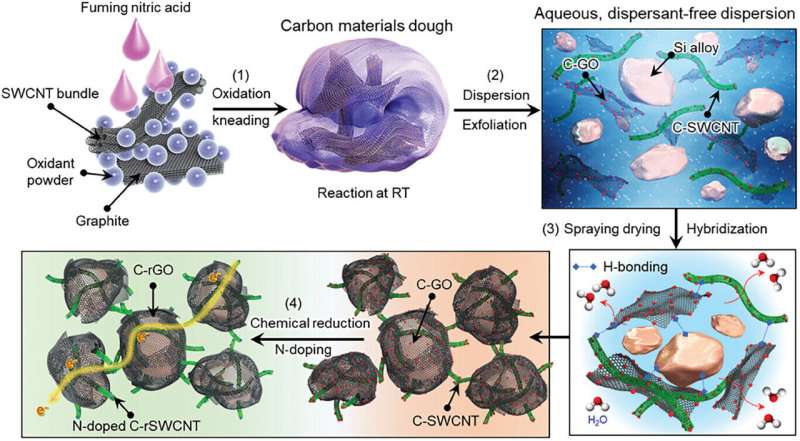

Single-walled carbon nanotubes doped with 'nitrogen' enhance the performance of...
source link: https://techxplore.com/news/2024-04-walled-carbon-nanotubes-doped-nitrogen.html
Go to the source link to view the article. You can view the picture content, updated content and better typesetting reading experience. If the link is broken, please click the button below to view the snapshot at that time.
Single-walled carbon nanotubes doped with 'nitrogen' enhance the performance of secondary battery anode
by National Research Council of Science and Technology

Researchers have developed a new manufacturing technique for "silicon/nitrogen-doped carbon composite anode materials." These materials aim to enhance the capacity and stability of lithium-ion battery anodes.
Silicon, despite offering significantly higher energy density compared to graphite (a common anode material), suffers from a major drawback: it expands 3-4 times during charging and discharging, leading to performance degradation. To address this issue, researchers are blending silicon with graphite to balance their strengths and weaknesses.
To maximize silicon content and overcome its limitations, the Korea Electrotechnology Research Institute (KERI) has utilized nitrogen-doped single-walled carbon nanotubes and graphene. Single-walled carbon nanotubes, being thinner and more conductive than multi-walled ones, present challenges in dispersion due to their small diameter. Leveraging their expertise in nanocarbon materials, KERI has developed a pioneering functionalization and colloidal dispersion technologies, facilitating the incorporation of nitrogen onto the carbon nanotube surface.
When applied to lithium-ion battery anodes, these nitrogen-doped single-walled carbon nanotubes accelerate lithium-ion movement to silicon, enhancing charging speed and stability across numerous charge/discharge cycles. Additionally, encapsulating the anode materials with graphene further stabilizes silicon expansion.
Through extensive testing, KERI has demonstrated that batteries utilizing their composite anode materials maintain over 82% performance after 100 charge/discharge cycles, compared to only 30% for conventional silicon composite anodes. This advancement eliminates the need for conventional conductive additives like carbon black.
The team, Dr. Han Joong Tark and student researcher Lee Do Geun at the Nano Hybrid Technology Research Center of KERI, envision broader applications for this technology, including solid-state batteries, where lithium diffusion speed is critical. The research findings have been published in the journal Advanced Functional Materials.
More information: Do Geun Lee et al, Dispersant‐Free Colloidal and Interfacial Engineering of Si‐Nanocarbon Hybrid Anode Materials for High‐Performance Li‐Ion Batteries, Advanced Functional Materials (2023). DOI: 10.1002/adfm.202311353
Recommend
About Joyk
Aggregate valuable and interesting links.
Joyk means Joy of geeK